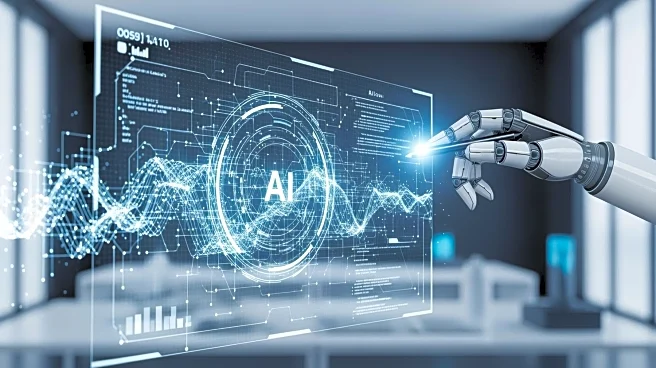What's Happening?
Anthropic CEO Dario Amodei has announced that artificial intelligence models are responsible for generating approximately 90% of the code used within the company. This revelation was made during the Dreamforce
conference in San Francisco, where Amodei confirmed his earlier prediction that AI would handle most coding tasks within six months. Despite the significant role AI plays in coding, Amodei emphasized that human engineers are still crucial, suggesting that the need for software engineers might increase as they focus on supervising AI systems and tackling complex programming challenges. This trend is not isolated to Anthropic; Y Combinator CEO Garry Tan noted that a quarter of startups in their program use AI to write 95% or more of their code.
Why It's Important?
The shift towards AI-generated code represents a significant transformation in the software engineering industry. While AI can streamline coding processes, it raises questions about employment patterns, particularly for younger developers. A study indicates a nearly 20% decline in positions for developers aged 22-25 since the launch of ChatGPT, highlighting potential challenges for new entrants in the field. However, experienced engineers remain in demand, suggesting a rebalancing of roles where human expertise is needed to oversee AI systems and address complex tasks. This development could lead to a reevaluation of educational and career pathways in software engineering, emphasizing skills that complement AI capabilities.
What's Next?
As AI continues to dominate coding tasks, companies may need to adapt their hiring practices and training programs to align with this technological shift. The demand for engineers who can effectively manage and collaborate with AI systems is likely to grow, potentially leading to new job roles and responsibilities within the industry. Stakeholders, including educational institutions and tech companies, may need to reassess curricula and professional development opportunities to prepare the workforce for these changes. Additionally, ongoing discussions about the ethical implications of AI in coding and its impact on employment will likely continue, influencing policy and industry standards.
Beyond the Headlines
The increasing reliance on AI for coding tasks could have broader implications for innovation and creativity in software development. While AI can enhance efficiency, there is a risk that it might limit the diversity of thought and problem-solving approaches traditionally brought by human developers. This shift also raises ethical considerations regarding the transparency and accountability of AI-generated code, as well as the potential for bias in AI systems. As the industry evolves, maintaining a balance between AI capabilities and human oversight will be crucial to ensure responsible and innovative software development.











